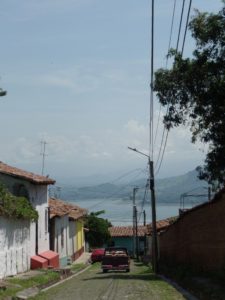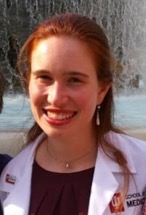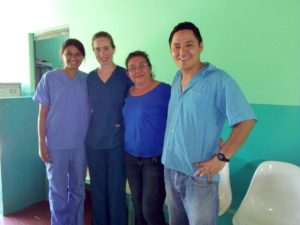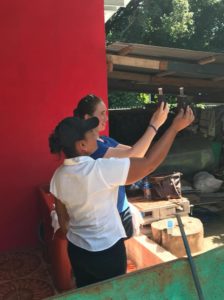Mennonite Health Journal
Articles on the intersection of faith and health
Mennonite Health Journal, Vol. 20, No. 3, July 30, 2019
Similarities and Differences in Healthcare
Student Elective Term (SET) Report (PDF)
By Leah Amstutz

View of Lake Suchitlan and a typical cobblestone street in the city of Suchitoto. This is the city where most of Leah’s clinical shadowing was.
I learned that there can be great similarities and great differences between the health systems and health care needs of two different countries. At times, I also experienced that the injustices that I found in those differences angered or upset me. I greatly enjoyed and appreciated this time in El Salvador to learn about and experience the health care system of a different country. The structure of private versus public hospitals, costs, availability of primary versus specialty care and the amount of community outreach are very different between El Salvador and the U.S. There were also differences and similarities in the types of common illnesses. For example, while parasites and some types of infections are much more common in El Salvador, both countries deal with high rates of diabetes, hypertension, and hypercholesterolemia.
Left to right, Alex Trevino (another medical student from IU), Leah, Dr. Orellana, and Yunior Gomez (local coordinator of the university program)
In general, I was impressed by the public health and community outreach that I observed in El Salvador. While healthcare access in rural areas is also a problem in the U.S., it is not to the same level as in El Salvador where it is rare to have a vehicle of your own and roads can be difficult to navigate. Having to walk long distances on hot roads is even more difficult when you are ill or have to carry a sick child. Therefore, midwives, community health promotors, and health department doctors who make community visits are especially important. Without their outreach to rural communities, it’s likely that many people there would not receive care or would postpone it for a long time. This matters because around the world there are many people who forgo or postpone healthcare for reasons of transportation, education, or cost. Even in the U.S., community outreach through doctors, nurses and public health workers is important to reaching underserved populations.
While I had many interesting learning experiences, the most emotional one happened with the midwives. The midwives are volunteers who bring pregnancy check-ups, health education, and sometimes social work directly to a community and sometimes right to the pregnant woman’s house. I went with one of the midwives to visit the house of a woman who was pregnant with twins. She was also the mother of one healthy boy and two children who had died from Maple Syrup Urine disease. This is an autosomal recessive genetic disease where the person lacks an enzyme that digests branched amino acids. The build-up of excess branched amino acids can lead to many serious symptoms and complications, including, in the case of those babies, death. People with this disease need to follow a special diet, which means a special baby formula that in El Salvador is very hard to get and extremely expensive. Since the family could not afford or access this special formula, both babies died within their first year.
In the moment of learning this story, my more prominent emotions were curiosity, surprise, and excitement at actually encountering a rare metabolic disease that I had learned about back in the first semester of medical school. However, as I reflected later, I thought more on the current anxiety and stress that the mother must feel because she doesn’t yet know if the twins she is carrying have the disease. More than anything else, I began to feel sad, frustrated, and angry at the injustice of the situation. In the U.S., there would have been specialists, appropriate baby formula, nutritionists, a whole medical team, and other resources.
Even if the family was poor, the babies could have received treatment as soon as the problem was known. The babies would have lived. This situation and the injustice of resource distribution and specialty healthcare reminded me of a quote by doctor and public health advocate Paul Farmer: “So I can’t show you how, exactly, health care is a basic human right. But what I can argue is that no one should have to die of a disease that is treatable.”
In light of this experience, I will be more sensitive to the resources that may or may not be available to my future patients. Although I remain passionate about the importance of primary care, I am more aware of and grateful for the level and quality of specialty care that is available in the U.S. During my career I plan to continue to be involved in global health, so I expect that I will continue to encounter stories such as the babies with Maple Syrup Urine disease and stories where the unequal distribution of resources caused large, preventable harm to someone’s health. I hope that my frustration and anger at those injustices continue to fuel the work and direction of my career and my interactions with patients.
About the author
 Leah Amstutz was a first-year medical student living in Fort Wayne, Indiana and studying at the Indiana University School of Medicine and Fairbanks School of Public Health at the time of this writing. Originally from Goshen, Indiana, she graduated in 2016 from Goshen College with a major in biochemistry and minors in Spanish and music. She has also served as a Spanish medical interpreter. She plans to complete both of her graduate programs in 2023.
Leah Amstutz was a first-year medical student living in Fort Wayne, Indiana and studying at the Indiana University School of Medicine and Fairbanks School of Public Health at the time of this writing. Originally from Goshen, Indiana, she graduated in 2016 from Goshen College with a major in biochemistry and minors in Spanish and music. She has also served as a Spanish medical interpreter. She plans to complete both of her graduate programs in 2023.


